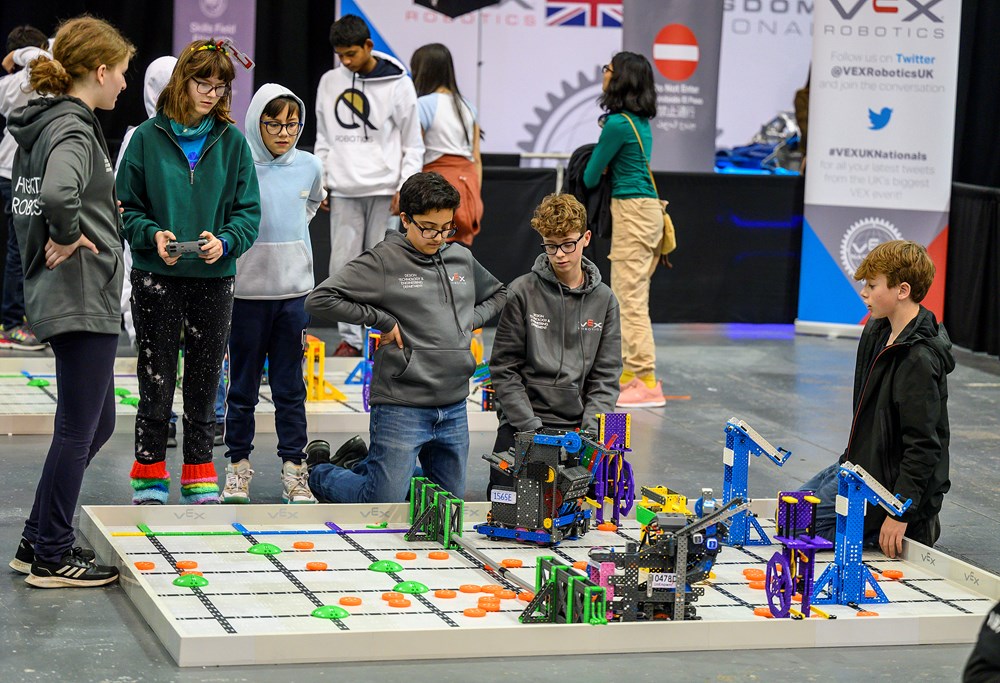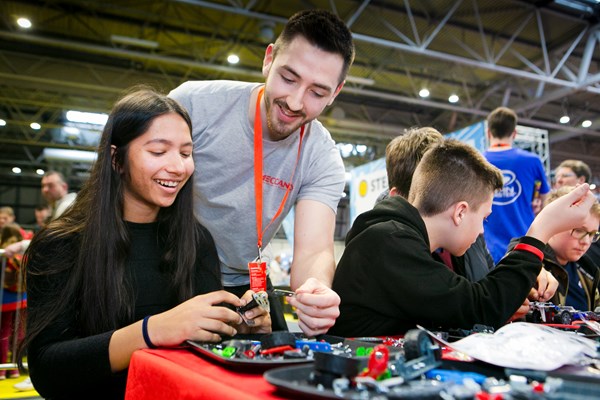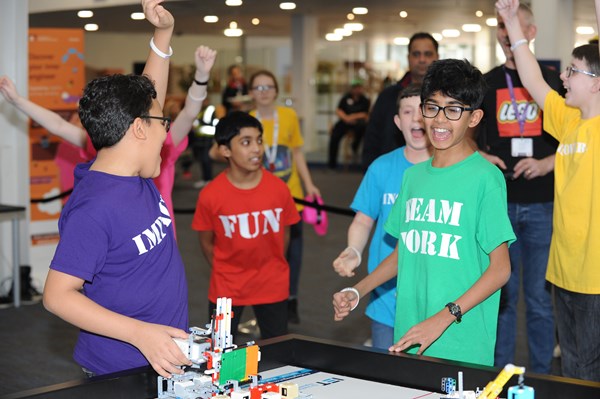- Ages 11 to 14
- In-school
- 8 May 2023 to 8 May 2024
- Multi-session
- Cost applies Bursaries available
Competition
VEX IQ Robotics Competition
Get involved in the world's largest robotics competition and bring your students' STEM skills to life!

Competition
Get involved in the world's largest robotics competition and bring your students' STEM skills to life!

The VEX IQ Robotics Competition brings STEM skills to life by tasking teams of students with designing and building a robot to play against other teams in a game-based engineering challenge. Using a VEX IQ robotics kit, the team create a robot that meets the demands of the game for that season in a mix of fully autonomous and student driver-controlled matches. They also present their Engineering Notebook to a panel of judges, who will look "under the hood" of the robot, the team, and the whole design process.
Classroom STEM concepts are put to the test as students learn lifelong skills in teamwork, leadership, communications, and more. Tournaments are held year-round at local, regional, and national levels (around 40 in the UK alone) that culminate at the VEX Robotics World Championship in Dallas each April!
Every tournament is supported by a team of volunteers along with the Robotics Education & Competition Foundation Regional Support Manager. STEM Ambassadors can work with teams to support teachers and also judge at events to give inspiration and guidance to attendees. The competition is open to all, globally, including schools, clubs, and independent teams.
By participating, students learn a range of skills they can apply and develop in school, as they move into further and higher education and, ultimately, take into their careers.
Cost
There is an annual registration fee of £125+VAT for the season. Teams require a robotics kit to build with - this is available from VEX Robotics and can be used year-on-year, so it's not an annual fee. Teams can attend as many qualification events as they wish.
Successful Neon bursary applicants will receive a full VEX IQ Robotics Competition kit and Team Registration for the 2023/2024 season.
Duration
The season runs all year. Teams can attend as many events as they wish during that season. Teams will typically meet weekly, or fortnightly early in the season, after school or during lunchtimes. This frequency can increase closer to events. The programme is designed to be student-led, so work can take place away from school by students. A typical team will spend a minimum of 6 sessions prior to an event working and developing their robot, but the team may spend as much additional time as they wish in preparation for an event.
Improve engagement, interest or enjoyment in STEM subjects
Improve attainment and progress in STEM subjects
Learning what the engineering workplace is like
Develop engineering employability skills
Improve awareness and aspirations for STEM-related study and careers
Challenge stereotypes by showing the diversity of disciplines, people and skills involved in engineering
The Gatsby benchmarks are a framework for good careers guidance for schools across all of England and in some areas across the rest of the UK. This experience helps your school to reach the following benchmarks:
The essential skills every young person needs to succeed in education and their future career. Find out more at the Skills Builder Partnership. This experience builds the following skills:
Aiming high - the ability to set clear, tangible goals and devise a robust route to achieving them.
Creativity - the use of imagination and the generation of new ideas.
Leadership - supporting, encouraging and motivating others to achieve a shared goal.
Listening - the ability to listen and understand information.
Problem solving - the ability to find a solution to a complex situation or challenge.
Speaking - the oral transmission of information or ideas.
Staying positive - the ability to use tactics to overcome setbacks and achieve goals.
Teamwork - working cooperatively with others towards achieving a shared goal.
What the teachers sayLog in to write a testimonialWe would love to read all about your time with this experience!

STEM Ambassadors from a wide range of STEM-related jobs to help bring subjects to life.

A robotics-based STEM competition that develops 21st century workplace skills.